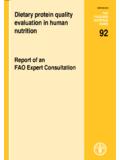Transcription of TrueSport Nutrition Guide
1 TrueSport Nutrition GuideOptimal Dietary Basics. For Sport. For by the Anti-Doping Agency (USADA)NutritioNal requiremeNts of athletes1 TrueSport Nutrition guideNutritioNal requiremeNts of athletescontentsCarbohydrates The Master Fuel Page 2protein s role as a Team player Page 12dietary Fat Page 16 Vitamins and Minerals Page 18 Fluids and Hydration Page 24resources Page 28 THe purpoSe oF THiS book This publication provides general guidelines to help optimize dietary intake for sports competitors. Dietary intake requirements can vary depending upon an individual s energy expenditure, metabolism, state of health, etc.
2 Now more than ever, athletes need accurate sports Nutrition information. Optimal Nutrition is an integral part of peak performance while an inadequate diet and lack of fuel can limit an athlete s potential for maximum performance. Unfortunately, there is a lot of misinformation available regarding a proper diet for athletes. In the quest for success, many athletes will try any dietary regimen or nutritional supplementation promising a new level of physical performance. However, most often an evaluation and modification of current dietary intake can be employed to help maximize peak human body must be supplied continuously with energy to perform its many complex functions.
3 As an athlete s training and competition level increases, the body s energy demands also increase. Several energy systems in the body can provide athletes with fuel as long as they are consuming the proper foods. One energy system relies totally on carbohydrates while another uses carbohydrates as well as fats. When an athlete works near or at maximal intensities, carbohydrates are the prime fuel the body can use. During prolonged exercise such as cycling, triathlons, and long-distance swimming, the amounts of fats and carbohydrates used may rise and fall depending upon.
4 F Duration and intensity of the exerciseF An individual s fitness level F Food and drink consumed prior to and during the exercise32 TrueSport Nutrition gUIDeTrueSporT Nutrition guideNutritioNal requiremeNts of athletesCarbohydrates The Master FuelA diet rich in carbohydrates increases endurance performance because of the extra store of carbohydrates in the muscles and liver, called glycogen. Work completed in the early 1980 s by David Costill at Ball State University showed that if athletes did not consume a diet high in carbohydrates on a daily basis, they would experience chronic fatigue and poor performance.
5 It is well documented that endurance athletes need to replenish carbohydrate stores in the body, especially during periods of intense training. Consuming carbohydrates during workouts lasting over one hour can also benefit performance and delay onset of fatigue. Several recent studies have shown that athletes who participate in stop-and-go sports, such as basketball and soccer, may also need to focus on consuming more carbohydrates during training and competition. This is not surprising since it is well-known that carbohydrates, when compared to protein and dietary fat, are the most efficiently broken down and metabolized form of energy for the body.
6 Athletes doing stop-and-go activities were found to have better speeds and delayed fatigue when consuming a higher carbohydrate diet. reCoMMended inTAke oF CArboHydrATeS Depending upon the training routine, athletes should consume at least 50 percent, but ideally 60-70 percent of their total calories from carbohydrates. This percentage is only a guideline for estimating carbohydrate needs. Depending upon the length of training sessions, an athlete s carbohydrate intake should be between grams per pound of body weight, with longer training times reflecting the higher number of grams needed.
7 See Table 1 to calculate grams of carbohydrates inTAke beFore, during, And AFTer exerCiSe Before Exercise: The pre-exercise or pre-training meal serves two purposes:F It keeps the athlete from feeling hungry before and during exercise, andF It maintains optimal levels of energy for the exercising who train early in the morning, before eating or drinking, risk developing low blood glucose levels, as well as a poor performance, due to a decreased ability to concentrate and an increased perceived exertion.
8 Blood glucose, the sugar found in the blood, is the energy delivered to the working muscles and organs that allows your body to complete activity. Low blood glucose levels cause you to feel more sluggish than normal and decrease your ability to focus, which inevitably will decrease (Focus on Your Intake)AS eArly AS THe 1930 S, SCienTiSTS obSerVed THAT endurAnCe exerCiSe Could be iMproVed by inCreASing CArboHydrATeS in THe 1: DETErMining graMs oF carBohyDraTE For aThlETEs nEEDsThe following example shows how to calculate the recommended grams of carbohydrate needed per pound of body weight.
9 Weight in Pounds Carbohydrates in grams Daily Carbohydrate Intake 160 x = 400 gramsNow calculate your own needs. Remember to multiply your body weight by a higher number of carbohydrate grams for lengthier or multiple bouts of training. For example, an hour of training per day may indicate using grams in your calculation, and training four or more hours per day may indicate using grams. Weight in Pounds Carbohydrates in grams Daily Carbohydrate Intake x = 54 TrueSport Nutrition gUIDeTrueSporT Nutrition guideNutritioNal requiremeNts of athletesCarbohydrate intake before exercise can help to restore sub-optimal glycogen stores, which is critical for prolonged periods of exercise.
10 While allowing for personal preferences and psychological factors, the pre-event meal should be high in carbohydrates, non-greasy, and readily digestible. Fatty foods should be limited as they delay the emptying time of the stomach and take longer to digest. The following are guidelines for the pre-event meal:F The meal should be eaten 3-4 hours before an It should provide 150-350 grams of carbohydrates ( grams per pound of body weight).F To avoid stomach upset, the carbohydrate content of meals should be reduced the closer the meals are to the Adding small amounts of protein can aid in regulating energy levels by slowing down carbohydrate absorption, delivering the carbohydrates to the working muscles at a more consistent rate over Pay attention to salty cravings.
